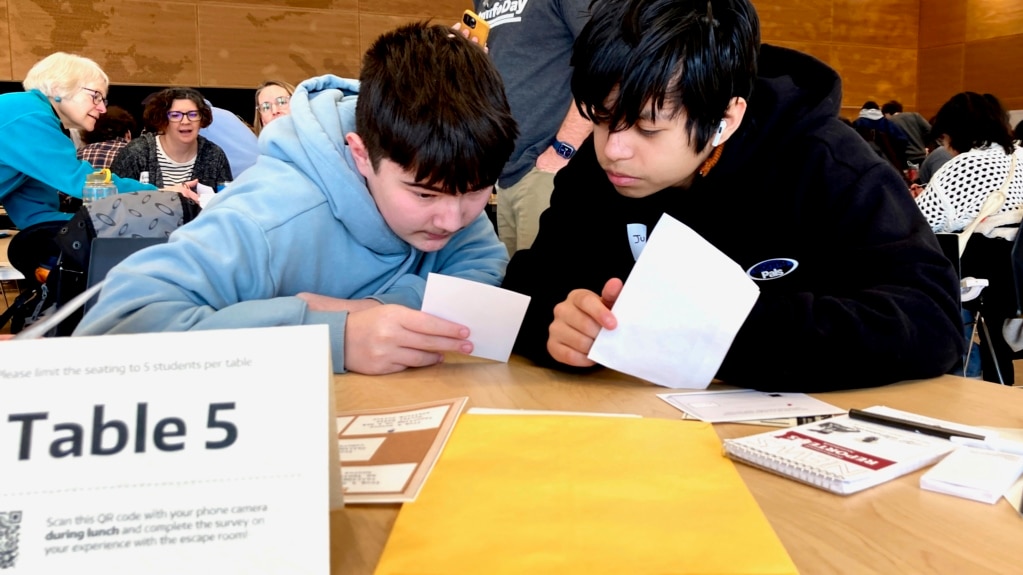More educators and researchers are bringing attention to misinformation spread through the internet and social media.
Teachers already face many difficulties. Adding what is called media literacy can be another be a problem. The concern is how some subjects are seen only as political issues. This could include issues like misinformation about vaccines, increasing world temperatures and even Russia’s war in Ukraine.
The Associated Press says that those opposed to teaching internet literacy say it is the same as thought control. This prevents some teachers from using it in their classes.
Julie Smith is an expert on media literacy. She teaches at Webster University in the state of Missouri. She said teaching media literacy is not teaching what to think, but how to think.
She said: "It's engaging about engaging your brain. It's asking, 'Who created this? Why? Why am I seeing it now? How does it make me feel and why?’”
Erin McNeil is a mother from Massachusetts who has worked as a reporter. She said that media literacy is a skill that is just as important as computer engineering for the economy. She created a nonprofit group called Media Literacy Now. The organization supports digital literacy education.
"Basic communication is part of our information economy, and there will be huge implications for our economy if we don't get this right,” McNeil said.
Shawn Lee teaches social studies in Seattle, Washington. He sees internet and media literacy as important for modern life as driver’s education in high school.
He has taught about double-checking online reports, getting information from more than a few places and using critical thinking. He also created an organization for teachers to share resources.
"This technology is so new that no one taught us how to use it," Lee said. "People are like, 'There's nothing we can do…I disagree with that. I would like to think the republic can survive an algorithm."
Teaching internet literacy to fight misinformation may be more effective than new laws and changes to algorithms. Some US states like New Jersey, Illinois, and Texas have added new standards for teaching internet literacy. Subjects can include how the internet and social media work, how to find misinformation by looking at many sources. Other ways of identifying misinformation might include looking for missing background information or recognizing emotional headlines.
Media literacy is often included in social studies classes like history or government classes offered at the high school level. But experts say it is never too early or late for people to become better internet users.
Media and internet literacy is taught around the world. In Finland, children learn about the internet in preschool when they are about four or five years old. The program is part of an anti-misinformation program for the population to be more aware and resistant to false internet claims.
Finland and Canada have developed programs over the years to teach young people about the media. The goal is to get young people to understand what in the news and on the internet is a fact, and what is not.
Finland has fought misinformation spread by its neighbor, Russia. Finland expanded its programs after the 2014 Russian invasion of Crimea.
Learning about misinformation does not stop in school. Finland has public service announcements and programs for older adults who are more at risk of misinformation than younger people, who seem more at home on the internet.
Petri Honkonen is Finland’s minister of science and culture. He spoke to the Associated Press during a recent trip to Washington, DC. His trip included discussions of Finland’s actions to fight internet misinformation.
"Media literacy was one of our priorities before the time of the internet. The point is critical thinking, and that is a skill that everybody needs more and more. We have to somehow protect people. We also must protect democracy," he said.
Media literacy programs in Canada began many years ago but have been expanded to the digital age. Mathew Johnson is the director of education at MediaSmarts, a nonprofit organization that runs media literacy programs. Johnson said media literacy is accepted as an important part of preparing students in Canada.
Media and internet literacy is often compared to driver’s education.
"We need speed limits, we need well-designed roads and good regulations to ensure cars are safe. But we also teach people how to drive safely," Johnson said.
Johnson added that people need to have the tools to think critically about what they see and read.
The internet and social media can be seen like the wave of new automobiles about 100 years ago. It took almost 30 years before the first driver’s education classes were offered. The government passed laws for vehicle safety and driver behavior. The auto industry added safety devices like seat belts and air bags.
This combination of government, industry and educators is considered the model that is needed for internet and media literacy. Education is needed for an effective answer to fight internet misinformation.
I’m Faith Pirlo.
And I'm Dan Novak.

